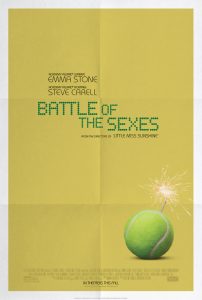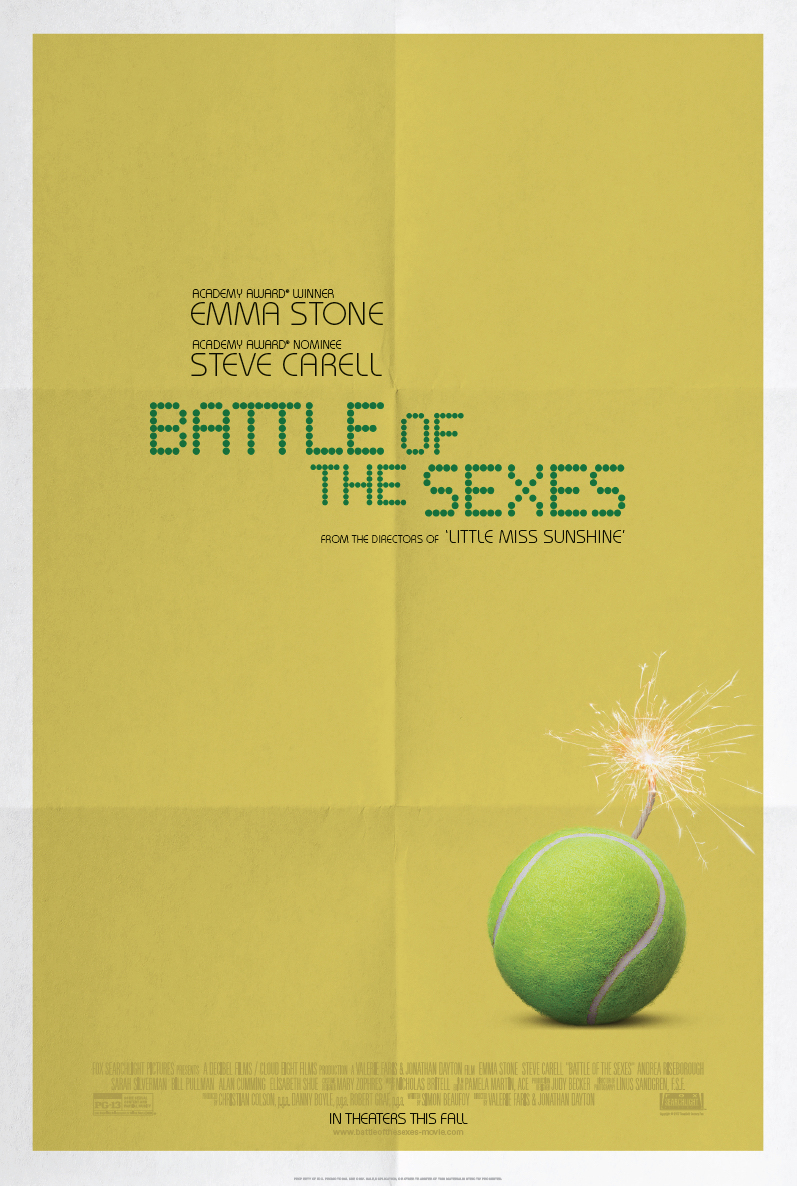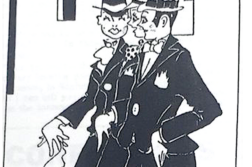 Battle of the Sexes
Battle of the Sexes
Directed by Jonathan Dayton and Valerie Faris
Cloud Eight Films, Decibel Films,
Fox Searchlight, TSG Entertainment
BATTLE OF THE SEXES recounts what was in fact the battle of the decade: the women’s movement and the sexual revolution versus the inevitable male chauvinist backlash, all telescoped into a single event in 1973. It was the demonstration tennis match between the reigning champion of women’s tennis, Billie Jean King, and the faded but formidable male champion of yesteryear, Bobby Riggs.
But first, a disclaimer: I hate sports. I had never set eyes on a Super Bowl game until Lady Gaga starred in the halftime show last year, dropping from the rafters like a bejeweled spider. Growing up as a Jersey boy in the early 1990s, I was so bad at baseball that I used to hide in the porta-potty reading Ginsberg’s “Howl” or the like to avoid playing. However, my mom was an avid tennis fan, so sometimes I watched tournaments with her, though I was usually thinking more about André Agassi’s mane or Ivan Lendl’s legs than about the match.
This explains why Battle of Sexes squeaks by for me as a watchable film, namely for its absorbing balance of professional tennis and some things I do care about, such as love, marriage, and selfhood. The movie follows the lead-up to the 1973 exposition match that featured Billie Jean King and her 55-year-old opponent, Bobby Riggs, who challenged her to a winner-take-all match that September. Billie Jean King, then age 29, was undoubtedly the greatest tennis player of her generation, and certainly the most famous, while Riggs had been a champion in the 1940s and became a well-known tennis hustler and promoter thereafter.
 The wildly hyped match took on huge symbolic importance as a “battle of the sexes.” On the big day, King was carried on a palanquin into the Houston Astrodome by a group of musclemen. On meeting Riggs, she handed him a piglet, a squealing symbol of the male chauvinism that he wore as a badge of honor. In return, Riggs (sponsored by Sugar Daddy candy) handed King a lollipop larger than a human head. Among the notables in the stands were Salvador Dalí and Glen Campbell. Ninety million spectators worldwide tuned in—the largest live audience ever for a tennis match. The match itself turned into something of a rout for King, who won in straight sets (6-4, 6-3, 6-3), taking home the $100,000 in prize money.
The wildly hyped match took on huge symbolic importance as a “battle of the sexes.” On the big day, King was carried on a palanquin into the Houston Astrodome by a group of musclemen. On meeting Riggs, she handed him a piglet, a squealing symbol of the male chauvinism that he wore as a badge of honor. In return, Riggs (sponsored by Sugar Daddy candy) handed King a lollipop larger than a human head. Among the notables in the stands were Salvador Dalí and Glen Campbell. Ninety million spectators worldwide tuned in—the largest live audience ever for a tennis match. The match itself turned into something of a rout for King, who won in straight sets (6-4, 6-3, 6-3), taking home the $100,000 in prize money.
It is hardly surprising that this Roman Coliseum of sexual politics has finally become a feature-length film. What is surprising is how forthright Battle of the Sexes is in depicting Billie Jean King’s inner conflict over her growing lesbian feelings. She is married to a man—a not unattractive man at that—but finds herself irresistibly drawn to her team’s favorite hairdresser, Marilyn Barnett, with whom her affair is heating up even as the showdown with Riggs is approaching. The film even hints that King’s victory was in some way helped along by Marilyn’s love and support.
In the film, both principals are impeccably cast. Emma Stone fairly channels King and her athletic stride, and Steve Carell captures Riggs’ brazenness while softening some of his roughness around the edges. The film was written and directed by the duo of Jonathan Dayton and Valerie Faris, who also created Little Miss Sunshine. Off screen, they’re a married couple with a keen sense of the personal and the political. They told The New Yorker (Aug. 8, 2017): “We were particularly intrigued by Billie Jean’s private life … and [how]at the same time, she was fighting for equal pay for women.” They were referring to the fact that the ratio of men’s to women’s prize money in tennis was about eleven to one.
The King-Riggs match was epic in large part because of its historical backdrop and the way in which it crystallized the feminist and sexual revolutions. It was a defining moment that legitimated women’s tennis and women’s sports in general. Leading a group of what became known as “Women’s Lob,” King had been lobbying, without much luck, for equal pay in tournament prize money. She drew the ire of the clownish Riggs when she pushed for equal pay at the 1973 U.S. Open, and stayed on his radar until their final showdown. By defeating Riggs, King catapulted her stature as a feminist hero into the ranks of Gloria Steinem, Betty Friedan, Jane Fonda, and a few others, though King was unique, argues sports historian Nancy E. Spencer, in functioning as a “Feminist Athlete Doll” in the “symbolic role of liberator for women.” She was also unique, of course, in being a lesbian, a private truth that would not become a public matter, much less a cause célèbre, until many years later.
Though it began production in the spring of 2016, Battle of the Sexes could not have been released at a more perfect time, and for two reasons. First, Donald Trump’s irresistible desire to plunge into the racial politics of “taking the knee” by NFL players reminds us that sports have always had a political side—Jackie Robinson and Jesse Owens come to mind. Second is the fact that LGBT and women’s liberation remain closely intertwined. Unless you were living on Saturn in 2016, you probably heard the one about a former New York Senator and Secretary of State who ran for the highest office in the U.S. and, despite being overqualified, lost to an overtly sexist, know-nothing publicity hound.
Prior to the release of Battles of the Sexes, veteran tennis pro and bigmouth John McEnroe faced the wrath of Twitter and ESPN punditry when he remarked that if Serena Williams were a male tennis player, she would rank “like 700 in the world.” He made the rounds on late-night TV to apologize and restore the peace. Meanwhile, Williams, pregnant at the time, stayed under the wire and delivered her riposte via Twitter: “Respect me and my privacy as I’m trying to have a baby.” This movie, by gesturing toward the present day, forces us to take stock of the state of women’s equality 45 years after this event at the height of the women’s liberation movement and asks whether that battle has been won, and clearly it has not—not by a long shot.
Colin Carman, PhD, a frequent GLR contributor, is completing a manuscript on the queer ecology of Percy Bysshe and Mary Shelley.






